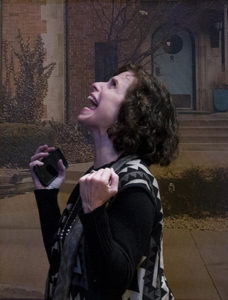AFFIRMATIVE RE-ACTION
 Don’t let the title fool you. Produced last year at Lincoln Center Theater, Admissions arrived too early to address the recent scandal involving illegal offenses in college admissions — bribes, cheating and gaming the system by rich parents with underachieving children. Felicity Huffman was still in the future (and past).
Don’t let the title fool you. Produced last year at Lincoln Center Theater, Admissions arrived too early to address the recent scandal involving illegal offenses in college admissions — bribes, cheating and gaming the system by rich parents with underachieving children. Felicity Huffman was still in the future (and past).
But this one-act by Joshua (Bad Jews) Harmon, now in a stirring Theater Wit staging by Jeremy Wechsler, remains topical, thanks to its sardonic take on liberal guilt over affirmative action and its exposure of double standards for entitlement and merit.
Over five months from Christmas 2015 to April 2016, Admissions imagines a typical crisis that illustrates this imbroglio and puts a lot of ideological conflicts into full play. Happily, it’s honest enough to avoid any resolution. Observing these case histories, the audience can reconsider such thorny “culture war” topics as reparations, quotas, tokenism, legacy admissions, and photo-shopping college applicants.
 Just as Goodman Theatre’s Sweat depicts how workplace inequities can divide and conquer old friends with adverse agendas, Admissions focuses on six familiars connected with the second-tier New Hampshire campus of Hillcrest Prep Boarding School (nicely illustrated by José Manuel DÃaz-Soto’s flexible sets).
Just as Goodman Theatre’s Sweat depicts how workplace inequities can divide and conquer old friends with adverse agendas, Admissions focuses on six familiars connected with the second-tier New Hampshire campus of Hillcrest Prep Boarding School (nicely illustrated by José Manuel DÃaz-Soto’s flexible sets).
For 15 years Sherri Rosen-Mason (an always excellent Meighan Gerachis) has been the school’s public-spirited admissions officer. Aided by her hilariously old-school assistant Roberta (Judi Schindler), Sherri is eager to increase minority enrollment in this 94% white enclave from 6% to 20%. She’ll try whatever it takes — scholarships, recruitment of needy students, Pell Grants, or brochures that cunningly exaggerate the student body’s diversity.
Headmaster at Hillcrest, her sensible husband Bill (a forceful Stephen Walker) — who becomes the play’s reality principal — has no illusions about the hurdles, necessary and not, between application and matriculation. He just wants folks, especially his teenage son, to be upfront about their drawbacks.
But the Mason’s uneventful domesticity lurches into crisis mode when their 17-year-old son Charlie (a forcefield named Kyle Curry) is not accepted at Yale University (where he’s dreamed of going all his life), while his childhood chum Perry (a strategically unseen African-American classmate) is.
Suddenly, all of Sherri and Bill’s progressive impulses for inclusion are turned on their head. It doesn’t help when Perry’s white mother Ginnie Peters (India Whiteside) takes offense when Sherri heavily hints that Perry, whose scores, grade averages and activity record are less than Charlie’s, didn’t catch a break getting into Yale. Their lifelong friendship is now in peril.
But the most wrenching reaction comes from excitable Charlie, a self-proclaimed victim who lurches from one extreme to the other — from racist resentment over reverse discrimination to noble self-sacrifice.
Charlie’s initial, Trump-like, response is to marinate in self-pity and fury over who decides what’s fair (especially if he doesn’t benefit from it). How, he rages, do we decide ethnicity and race and how do we justify the penalties or rewards thereupon appertaining? Why must he be punished with a Yale deferment as payback for centuries of white privilege?
But, acknowledging the complex ambivalence of this young pawn of the process, Harmon has this drama queen make a 180-degree turn: Charlie quixotically resolves to become a martyr to educational equity and political correctness through an act of renunciation. He will abandon his unearned advantages by giving up a degree altogether or settling for community college. The impetuous lad orders his parents to use the money they saved for his higher education as a scholarship for a deserving victim, which he thinks he’s not.
Of course, this burst of scary purity totally flummoxes his parents who are now not above influence-peddling in order to get Charlie into the local Middlebury College. We’re at an impasse, not unlike the nation. Fortunately, given 100 minutes of authentic acting, it’s all been totally believable.
Harmon fares well at covering the question from all sides, avoiding wishful thinking, rote responses, or predictable conflicts. Avoiding David Mamet’s smug hypocrisy, the play never takes cheap shots at limousine liberals. Thanks to Curry’s frenetically forceful performance, Charlie in particular seems to embody all the arguments at once. The actor’s anguish perfectly fits the character’s confusion.
We end up with a play that doesn’t choose sides but forces an audience to. That’s no small feat.
photos by Charles Osgood
Admissions
Theater Wit, 1229 W. Belmont Ave.
Thurs-Sat at 7:30; Sun at 3
ends on May 12, 2019 EXTENDED to June 9, 2019
for tickets, call 773.975.8150 or visit Theater Wit
for more shows, visit Theatre in Chicago






